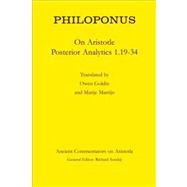Philoponus: On Aristotle Posterior Analytics 1.19-34
, by Goldin, Owen; Martijn, Marije; Philoponus, John- ISBN: 9781780930909 | 1780930909
- Cover: Hardcover
- Copyright: 11/22/2012
Aristotle described the scientific explanation of universal or general facts as deducing them through scientific demonstrations, that is, through syllogisms that met requirements he first formulated of logical validity and explanatoriness. In Chapters 19-23, he adds arguments for the further logical restrictions that scientific demonstrations can neither be indefinitely long nor infinitely extendible through the interposition of new middle terms. Chapters 24-26 argue for the superiority of universal over particular demonstration, of affirmative over negative demonstration, and of direct negative demonstration over demonstration to the impossible. Chapters 27 34 discuss different aspects of sciences and scientific understanding, allowing us to distinguish between sciences, and between scientific understanding and other kinds of cognition, especially opinion. Philoponus' comments on these chapters are interesting especially because of his metaphysical analysis of universal predication and his understanding of the notion of subordinate sciences. We learn from his commentary that Philoponus believed in Platonic Forms as inherent in, and posterior to, the Divine Intellect, but ascribed to Aristotle an interpretation of Plato's Forms as independent substances, prior to the Demiurgic Intellect. A very important notion from Aristotle's Posterior Analytics is that of the 'subordination' of sciences, i.e. the idea that some sciences depend on 'higher' ones for some of their principles. Philoponus goes beyond Aristotle in suggesting a taxonomy of sciences, in which the subordinate science is the same in genus as the superordinate, but different in species.







